|
So we thought it was a neat initial conversation, and we liked the people, which was helpful. And they seemed very, very bright and very, very enthusiastic. So from there we went to the next conversation.

And the next conversation was?
"Would you like to design uniforms for Song?" And our response was: "Well, that depends. What else are you doing, and who else are you working with?" They were in the initial stages of development. "What will the airplane look like? What will the interior look like? What will our uniforms be surrounded by? Who are you recruiting? What will be the attitude of the flight attendants? What will the gate look like? What will the music be like? What will you offer beyond the organic food and the fresh food? What are you doing in terms of entertainment?"
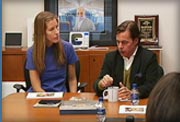
That's when they started talking to us about these ideas, some of which they had already confirmed -- one of which was the chef and having fresh and organic food; also, their relationships with companies like Stoli at the time. They were talking to Disney at the time, since they've actually done some work with offering Disney movies and entertainment online.
So there were just a lot of neat things they were doing, so we said to them, "Great, we'll do it as long as we can be involved in anything that you're doing to protect our brand, to make sure that your brand is living up to what we've built over the last 10 years in terms of what Kate Spade has developed."

So you were really lending your brand to another brand.
Well, that was the question: Were we willing to do that? And the only way we were willing to do that was knowing and having some sort of guarantee that they would be doing things that lived up to, I think, the integrity of Kate Spade. Was it the right strategic relationship and alliance for us? That's when the relationship started evolving. We started talking about what it would be before we committed to anything.
Then they started saying, "Well, would you like to come in and help serve as a consultant on the brand?" And they have a lot of terrific partners -- an advertising agency, Kirshenbaum Bond, who's fantastic. I've worked for them in the past; I knew that was a great decision on their part. They were working with the chef, talking to Disney, talking to people downtown in the Chelsea area, the meatpacking district, about sponsoring some ideas at the fashion shows. They also were developing a concept store, which we've always wanted to do, and we loved the idea. So we knew they were doing very intelligent things. And I got very involved in the development of what Song could be.

Tim [Mapes, Song's managing director of marketing] said that you understood better than they did how to achieve what they were going for with Song.
Well, I think the reason why [they're] saying that is I can be objective, even working here at Kate Spade on Kate and Jack Spade. There are days I think I intuitively understand it because it came from my wife and myself and some other people who we've worked with over the years.
But fortunately, my background is advertising, so I've worked on branding before, and I've worked with different companies, from fashion companies to car companies to other airlines. I've done this in the past, so I have a different point of view on it. I think Tim and Joanne [Smith, Song's vice president of marketing] are the clients, and they understand exactly what they're trying to do. What we try to help them do is channel those ideas and visualize those ideas and help them in a creative, interesting way articulate what it is they're trying to say.

So you really got to build the Song brand from the ground up.
Yes, that's the beauty of it, I think. I don't think we would be interested in working with a brand, with the exception of a few brands, that already exist. But Kate and I are entrepreneurs, so we love building this. And the fact that they were open to involving myself and Kate and some of our people really made it more interesting. We love doing that, and we felt that we could hopefully add some ideas and bring some of our experience to the airline.
And we've lived in New York City for many years now, and we've been to all the hotels; we've traveled. We understand certain components of the industry because of the amount of travel we do and where we go around the world. So we thought that would be great to use all these ideas and all these experiences and bring them to an airline.

How did you go about developing a brand identity?
You look at, obviously, the competition, and you look at what's being done on the ground in terms of different hotels as examples, as reference points -- not to imitate them, but to learn from them. In the low-cost carrier category, there's really JetBlue right now, and that was one of the first to launch here in the States. And another one's coming out I think in the next few months, which I won't name.
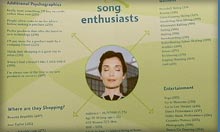
And the idea was, what airline represents something that's very, very optimistic? I think the idea of bringing optimism to something, I think the idea of style ... I can't name off the top of my head one airline in the States that I associate with style. The idea of being classic and gracious was something that we all talked about and loved that idea. It's the combination of all these things, the result of which is hopefully a new experience for you.
We also talked about casting the talent and having the people be hosts and hostesses on the plane, to really treat it as if it's theirs and take some ownership of it and treat the person right -- some people don't want to be talked to, some people do; understanding the difference and knowing that sometimes when I fly or you fly, we want to be left alone; other times you don't, and you want someone who's friendly.
So we started to talk about all these things that were missing and building it around this idea and started adding the components. Certain things I think over time will evolve, and other things we'll maybe take away. We're not flying in a different way; it's the same way. But I think it can be better. If you make your experience 50 percent better than it has been on other airlines, that's huge.

What is the brand experience of Song?
You can't say it; you have to demonstrate it. When we speak with Song, when we have our conversations, we never want to be too boastful or overpromise what it is. I think over time the people who fly will tell us whether it worked or not, and they'll say, "This is working"; if it isn't, we adjust it. Over time you'll know whether you're doing something right or something wrong. We just have to do four or five things that are the stimulus for the people on the plane walking away with that response, which is, "What a great experience that was."

Why hasn't this been tried before?
What I understand is that the industry itself has been for many years in a crisis. It's a big industry, and the model needed to change completely. The fact that Delta actually split Song off as a separate unit was very, very important and critical. These are big, big companies with a lot of people, and there are a lot of things involved that they can't control. I think putting a smaller group on something rather than a committee on something helps to actually get things done and move quickly, and they're more nimble than most.
I just don't think they've done it this way [before now]. It's odd to me. I honestly don't understand it. If I were to do it, I would think it would be the obvious thing to do, if you look around at what's happened in our world. Everyone else has brought style and service to their industry, so why shouldn't the airline industry?

How do you get around people's negative associations with air travel?
I think very gently, one step at a time, you have to prove it to them. If we can create a better experience for them, they're going to walk away and say, "This is a better experience." But their expectations are very, very low. So if you can improve on that standard which is very, very low now, you're in the game.
I think you can try to control the elements that you can control, and those that you can control hopefully will make an impact on the consumer who's flying. And those that can't [be controlled], I think they'll have to forgive you for. Obviously there are a lot of things that we can't control, but I think people expect you to control the things that you can. And I think you should be able to control the food; you should be able to control the service, to a degree. You'll always have one or two [crew members] that aren't perfect, but that's true in life, and I think people understand that they're just people.
No such thing as a company -- it's just a bunch of people trying to do things well. They'll appreciate your effort, appreciate you offering these services in terms of entertainment in television and music, appreciate the uniforms, [to] make it a more pleasant experience.
And if those work and a few others don't, at least they'll say: "Well, I'm either going to fly Song or X. You know what? Song is trying harder to do it better; I'm going to go with this one." I think that's how it works.

How do you go about training flight people?
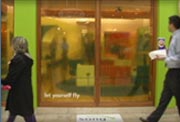
You can't force people to be sincere, but you can give them guidelines. There are how many flight attendants flying on Song every day? We have, I think, 14 retail stores around the country right now, and we have people come into our stores every day, and we talk to the people about what we represent, who we are, how to handle things, what to do. In certain circumstances, someone woke up on a bad day, came in and maybe didn't do it appropriately that day, and that cannot be controlled. There's no way you're going to have a 100 percent rate of success. However, you can have some parameters and say: "This is how we would do this, and this is how we would do this"; "If this happens, try to respond this way, and if this happens, respond this way"; "The customer's always right" -- those kinds of things. And I think the more you reinforce that and the more you reward people for doing that, I think it will make it a better experience for the flight attendants.

What is the spirit of Song?
The spirit of Song is different than the spirit of JetBlue and different than the spirit of American or different than the spirit of an airline like Southwest. So we're trying to find our own place. We know what it is, but again, execution is a very delicate part to deal with.
I think we've talked about this idea of graciousness, about this idea of treat others as you would like them to treat you. Be respectful; be attentive. We love the idea of people obviously being happy without being overzealous, because sometimes that can be too much for people. For example, I don't want anyone talking to me incessantly about how my trip is or where am I going, what am I doing. You want to make note of everyone who's on the plane and address them in different ways, ask them what they're doing, how are they, welcome, thank you for coming. And you can only be what you are. You can't really fake that, so I think we're trying to channel what Song wants to be into words and into language and a vocabulary that all of their people can use and kind of pick and choose. It has to have some flexibility to it, but we don't want one guy over here singing a song, and then someone else comes in and acts like a general. There are different ways to treat it, and generally it's be human and be gracious; treat people in the way that you would like them to treat you.
I think what differentiates Song is the emotional component of it. If you look at other airlines, especially in North America today, I don't see anyone doing anything that really has resonance on an emotional level that really makes me feel something beyond what's logical or what's practical. You can obviously look at an airline and say, "OK, you have more legroom than they do." And on one level I think that's great, but it doesn't stick with me. The next month I'll see someone else who has another two inches of legroom. So overall you're competing for, in my opinion, a small benefit. Those things add up to something greater, obviously, the TV and the food and those [other things].
But at the end of the day, a lot of airlines can copy other airlines. It's not illegal to suddenly go and hire a chef and create your own menu that's unique to you. So what really differentiates something from another thing? I think it's creating something that communicates to people on another level, beyond a logical level.
When I look at Apple and I look at Volkswagen, obviously they both have great products, but there's something about the humor and the irreverence of those things that I identify with. I kind of think their end of the commercial should say, "We know you're out there." I love that they're irreverent; I love that they're intelligent; I love that they're smart, and they're innovating, and they're doing things. Apple, for example, it's definitely product advertising, but it's so much brand advertising. The iPod advertising is great; it's all about a product, but it's doing it in such an interesting and emotional way.
There are five to 10 different brands right now that I can speak to that do that well and they become a part of culture. And I think at the end of the day, you want to become a part of culture. When you get to that point, you've created a huge success. The Song airline, it didn't exist 10 years ago, and now I think about it today, and it's really changed the way that people think about things. And we've become a reference point. It would be great to have other airlines using them as a reference point and say, "Let's look at Song and see what they're doing."
I said: "Don't try to be the next JetBlue or Virgin; be the next Song. And we don't know what that is yet. Let's create that, and that will be something new." And that's what all the great companies have done, from Virgin to Apple to others. And that's why I'm interested in working with them, is that's what they're trying to do; they're trying to create that. And that, I think, is going to be the success, as long as they can land on time, take off on time, serve the food on time, make sure the meals are warm, not spill anything on the passengers.

I would be curious to know what you think it is for Kate Spade, what that spirit or feeling is, and how it relates to the spirit of Song.
Song can't be exactly Kate Spade. I think the similarities between Kate Spade and Song is, one, it's entrepreneurial; they're risk takers; they're creating something from nothing, which I think is fantastic. They came to us, they already had the outside of the planes painted and some of the interiors done, which I thought were great. They used a color green which we call Kate Spade green. They had a spirit about them. They talked to us about making it more human, about it being optimistic, about it being classic to a degree. They don't feel like they are cool or edgy. That's not, in my mind, who they want to be or they should be. It's not what they are, so why try to be something you're not? Try to be something you are, which is a great thing. So I think it's going through all those things that they have, and all the equity that they have and the potential equity they have, and [saying]: "What kind of ideas can we extract from that? What can we build around that? What makes sense? What doesn't?"
You know, you can draw a graph and say, "This does; this is going a little further outside of it; this is going real far, but you can go here, but people may be a little bit shocked." For example, they sponsored this stuff in the meatpacking district. That's a little further out. That pushes it further out. I think you just have to know your boundaries, and sometimes you can do that. Sometimes you have to stay closer to the middle.
But I think people always want you to evolve. People get bored quickly, and in the culture today, everything's changing constantly. So I think it's good for them to keep people guessing. I think they should know where they live, basically, but also they can always move around the neighborhood.

How do you advertise a spirit?
I think you just create something that has spirit, that has a point to it, that communicates something that people see or hear and say, "Wow, I like that; that was great, and that told me that this airline has fresh food. It seems like it has a great feeling to it."
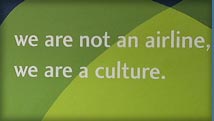
I can't tell you I have a feeling; I have to create that feeling. You can't come on TV and say, "We're the cool spirit." You can't say that. You just have to do something. You offer that, and hopefully people see it, and they say: "Wow, that's great. You know what? When I go to the airport or I'm looking through a magazine, I see Song, and I think wow, that kind of seems like a neat thing, so maybe I'll try that." And they'll say: "Well, how much? What's the flight? It's $299. Oh, well, everyone else is $299; I'm going to try Song." We're trying to create awareness for this thing in the appropriate way, by saying it's this and this and this. You can't do it all at once, but we're just trying to create kind of an identity for what Song is. You know they're going to end up competing on price, so you have to do something beyond that that people will fly you for.

Tell me about the commercials.
We have five, and we're talking about focusing on three to four of those five. We're going through some copy revisions and bidding out to different boards. It actually evolved out of the print campaign. We originally worked on print ads which we did in-house. And after that we were thinking just naturally out of the print advertising that we worked on. So it kind of springboarded off of the initial concept which was print, based on this line that came from the Kirshenbaum Bond agency, which is "Let yourself fly." And "Let yourself fly" is a spirit; it's talking to this idea; it's big. But it also has to speak to a benefit. And each spot speaks to a benefit, but it does it in, hopefully, an entertaining way.

You can do both?
You can do both in the same ad. These tend to be more brand advertising with a product attribute built in rather than a product-attribute ad with a little bit of branding to it. I think it's their one opportunity, with all the people now getting into this category who could take their position away. I think they should get out immediately in terms of long-term positioning for the company and really make a statement as to who they are and why they exist. And obviously you can do that and make a product. Otherwise it's just a waste. I would never recommend a commercial that didn't say anything. But there are many creative ways to say that we have fresh, organic food, and there are many creative ways to say that we have music and all these great entertainment opportunities and offerings.
So it started with each product benefit -- which were the priorities, which ones do we want to talk about, which ones really differentiate Song from others -- and then creating commercials and print ads around those, and then making sure that they all work together as a group and that they all communicate in a similar way so that they have the same voice and the same feeling and the same spirit, which all goes back to this idea that we obviously don't know exactly what it is, and we're starting to develop it and feel it. And that evolves. But it's very subjective. Creativity is very subjective.
And I think it was [advertising legend] Bill Bernbach who said you have two ways to do advertising: One is you can do it in a really interesting, creative way, and it'll work and raise society to another level and entertain people; or you can do it in a very base way and just kind of bang home product attributes, and that will work, too. I think the approach that we would recommend would be to communicate a benefit that differentiates you, but do it in a way that has spirit, because I think that has more longevity.

How did you develop the emotional component of the ads?
Obviously we love the idea that the client actually talked about. Tim [Mapes] and Joanne [Smith] were talking about the idea of music videos and saying: "Well, you know, there's entertainment and there's commercials. Actually, they're the same thing, or they should be the same thing. I mean, you don't differentiate anymore between what that is." So we said: "Let's do a 30-second music video but incorporate a product attribute without trying to really sell the product attribute. Just let people know it's there."
So they're not really music videos; they're kind of a morph between a music video and a commercial. And you have seen great commercials for Nike and others who do this. They do it very, very well, incredibly well. You don't even know what the product is or that the company is selling you a benefit, but you get it. And you walk away thinking, I love that commercial. But you also know that there's air in the shoe or something. Whatever it is, they built it around that in a way that's seamless.
So we started going through the library and looking at different music and different ideas and delving into different kinds of music, listening to, for example, classical music, and then listening to emo music and music like Sheryl Crow and people like that -- that's kind of too exposed right now -- and then looking back at '60s and '70s, and looking at things that will conjure up feelings that we've forgotten about, that aren't contemporary but that really have this great rhythm and feeling to it. We started looking at other bands, contemporary bands like Wilco and Kings Of Convenience.
And so we started just bringing songs together -- what does this song say? Does this song communicate anything? Should it communicate anything? Does it feel right? -- and then putting them all together and saying, "If we had this song, what would the spot be?" And sometimes the idea would come [first], and the song would come after. Sometimes we'd have a song -- "This is a great song; what can we do with it?" -- and then we'd create around it.
But all of them had this kind of very, very light, optimistic -- you don't think it's cool or you don't think it's not cool; you just like the spirit of it. We didn't want them to feel that they were retro in any way; that you couldn't really put your finger on them because they're timeless, but they definitely come from another place. And that's when we started getting that feeling: When we play that song versus that song, that feeling gives me this feeling that we're looking for, and I can't put my finger on it; I don't know why, but it does. You start narrowing it down by listening to it, and over time, you get the right feeling for it. Then you design these commercials around these things.

What about the visual references?
We looked at a lot of films at the same time which actually paralleled the music and the feeling. We looked at The Red Balloon; we looked at [François] Truffaut; we looked at [Jean-Luc] Godard; we looked at contemporary films by Wes Anderson, which had great spirit. Some music from Betty Blue was interesting. We looked at Woody Allen films. We looked at God, so many. I'm trying to go through all the different references we had. I can't remember them all.

It's a very crowded media space that the commercials are being released into.
You just have to do something that people want to watch. When you're looking at television, looking at things, initially you see something that reminds you of something you've seen before, [and] I think generally you get bored. But if it's something that I like -- the music or I kind of like the way it looks visually or something about it I like -- I get intrigued, and I stay with it.
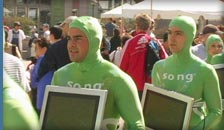
People have so many options now; they can do so many things. If you can't live up to what's happening on MTV or VH1, if it's not working on that level, I think that you're going to be ignored. You're competing with entertainment, with things going on outside. You're competing with what's going on in the kitchen, with all these things. It's not just other ads. So I just think you have to make it somewhat unique. Otherwise I think that -- unless you have a billion dollars to spend; that way they can't hide; you can't miss them -- you have to try to do something that's unique.
As we go through the next three to six months, we'll start looking really closely at things. And things may evolve; things may change; people will get nervous; people will say: "Is this saying enough? Is it communicating enough? Should we pull back a little bit on part of it and add more benefit-oriented stuff? How can we do that without undermining the integrity of what we're trying to do? How do we work that out?" And we all stand in a room and say, "I think that's going too far on the product side; we're missing the feeling that we intentionally tried to create." And then someone will say, "Well, I think we need a little more."
I think you feel it. You look at it, and you say: "It's not working anymore; we added too much of this other. What's the correct balance?" And I think that's going to be the challenge over the next six months. It may change. Some of these commercials may go away completely, and we have to go back and start over again. That's how it happens.
|